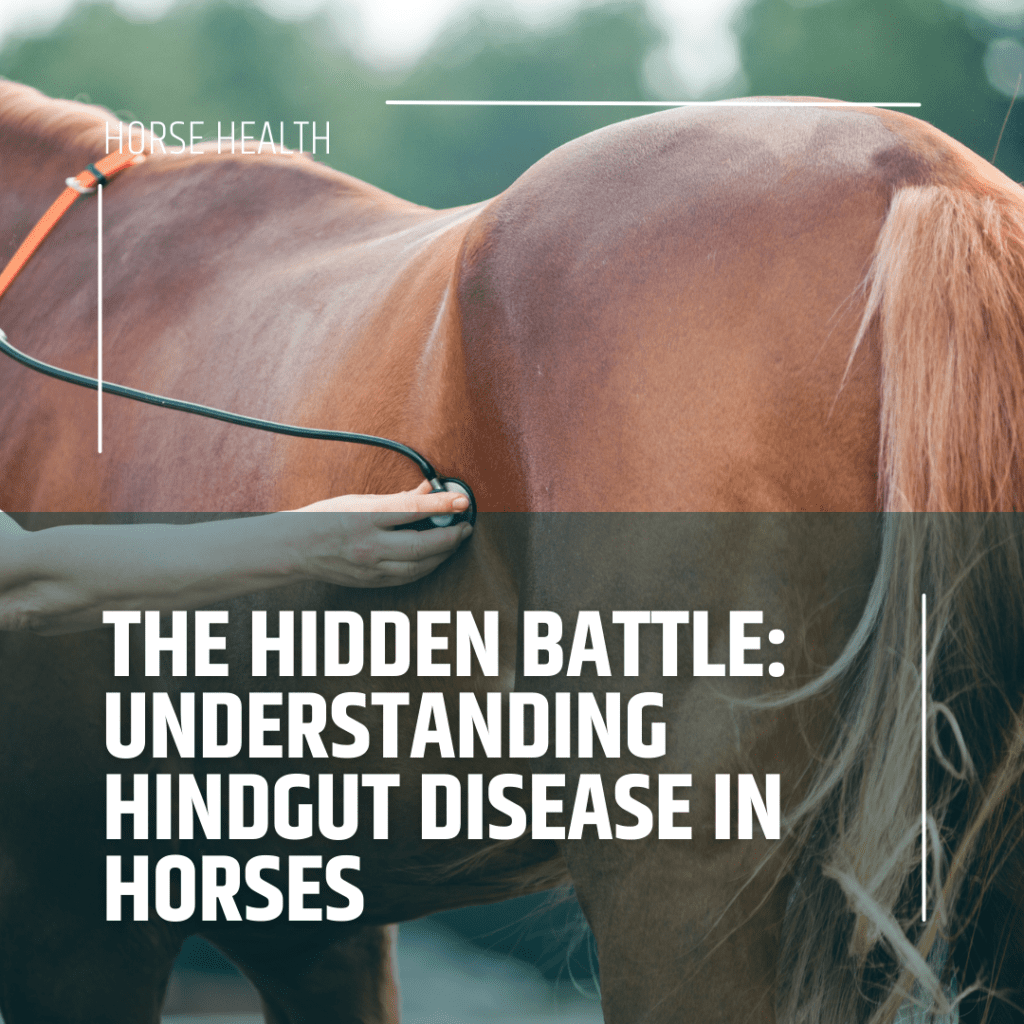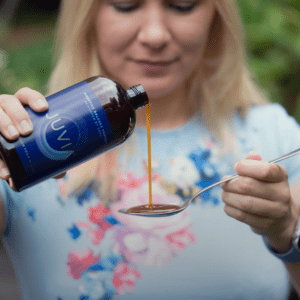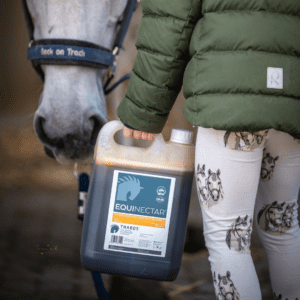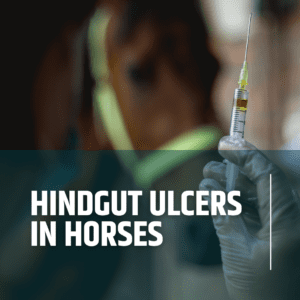
Ben Nedas
Chief Commercial Officer
The Hidden Battle: Understanding Hindgut Disease in Horses
Originally published on September 27, 2023, this guide explores the causes, symptoms, and impact of hindgut disease in horses, and highlights how EquiNectar can play a supportive role in maintaining healthy digestion.
01
Introduction
The health of a horse's digestive system is critical in the broad field of equestrian care. Although it is not visible, the hindgut is an important part of this system and can have a major impact on a horse's performance, attitude, and general health when it is ill. Maintaining the balance of the gut microbiome is essential for hindgut health. This article will discuss the causes, signs, and effects of hindgut disease as well as the importance of the microbiome to a horse's general health.
The equine hindgut comprises the caecum, large colon, small colon, and rectum, collectively accounting for approximately 65% of the total digestive tract capacity. This remarkable organ system houses trillions of microorganisms that work cooperatively with the horse to extract nutrients from fibrous plant material that would otherwise be indigestible . When this delicate ecosystem becomes disrupted, the consequences can be far-reaching, affecting not just digestive function but also behaviour, performance, and overall wellbeing.
02
Causes of Hindgut Disease
Hindgut diseases in horses can be attributed to various factors, with diet being a significant contributor. Rapid changes in diet, high-starch feeds, and inadequate forage intake can disturb the delicate balance of the gut microbiome, leading to hindgut acidosis. Overuse of non-steroidal anti-inflammatory drugs (NSAIDs) and antibiotics can also disrupt the microbial balance, making the horse susceptible to diseases like colitis and laminitis.
Dietary Factors and Starch Overload
High-carbohydrate diets, particularly those rich in rapidly fermentable starches and sugars, represent one of the most common triggers for hindgut dysfunction (1). When excessive starch escapes digestion in the small intestine and reaches the hindgut, it undergoes rapid fermentation by lactic acid-producing bacteria. This leads to a proliferation of these bacteria at the expense of beneficial fibre-fermenting species, resulting in increased lactic and acetic acid production. The subsequent pH drop can cause hindgut acidosis, with faecal pH falling below the normal range of 6.4 to 6.7 seen in grazing horses (1).
The Fructan Challenge
Another significant dietary challenge comes from fructans found in fresh grass, particularly during spring and autumn when grass is lush and growing rapidly. These complex sugars are resistant to digestion in the small intestine and, when fermented in the large intestine, can trigger similar acidotic conditions (2). This process may lead to colitis and has been implicated in laminitis cases, making pasture management a critical consideration for horse owners.
Pharmaceutical Impacts
The use of NSAIDs, whilst often necessary for pain management, can compromise the intestinal barrier function and disrupt the protective mucous layer of the gut. Similarly, antibiotics, whilst treating bacterial infections, do not discriminate between pathogenic and beneficial bacteria, potentially leading to dysbiosis that may persist long after treatment cessation .
03
Symptoms, Subtle Signs, and Impact on Performance
Horses suffering from hindgut disease may exhibit a range of noticeable and non-visible symptoms that have a substantial impact on the physical health and behaviour of the animal. Recognising these signs is critical for early detection and intervention, ensuring the horse's continued health and happiness.
1. Observable Symptoms:
The most immediate signs of hindgut disease include loose droppings, bloating, and abdominal discomfort. These are indicative of internal discomfort and imbalances disrupting the horse’s digestive function. Loose droppings result from an imbalance in the gut flora, affecting water absorption in the colon, and along with bloating, can lead to severe discomfort and colic.
2. Mood and Behaviour:
Beyond physical symptoms, a horse suffering from hindgut disease may exhibit mood swings, irritability, and a decrease in appetite. The discomfort and pain can make the horse restless, unwilling to work, and prone to aggressive or withdrawn behaviour.
Research has increasingly recognised that gut health directly influences behaviour through the gut-brain axis. The chronic discomfort associated with hindgut acidosis can manifest as irritability during grooming, resistance to tacking up, or general grumpiness that seems out of character for the horse (2).
3. Performance in Work:
The disease compromises a horse’s energy levels, leading to a decline in performance. Horses may exhibit lethargy, weight loss, and decreased muscle tone, impacting their ability to train and compete effectively.
The reduction in short-chain fatty acid (SCFA) production that accompanies hindgut dysfunction represents a significant loss of energy substrate. SCFAs, particularly acetate, propionate, and butyrate, normally provide a major component of equine nutrition, contributing substantially to the horse's daily energy requirements (1). When hindgut health is compromised, this energy source diminishes, often before other obvious clinical signs become apparent.
4. Subtle Signs of Discomfort:
- Unwillingness or Irritability Lifting Up Rear Legs: This can indicate underlying abdominal pain or discomfort originating from the hindgut.
- Issues with Canter: Horses may exhibit difficulty transitioning into or maintaining a canter, displaying irregularities in gait or a lack of impulsion.
- Girthiness or Irritability When Being Groomed: This hints at internal distress, particularly around the abdominal area.
- Tucked Up, Uncomfortable Movement: A tucked-up appearance and stiff movements signal discomfort in the hindgut region.
- Spookiness and Hyper Sensitivity to Stimulus: Increased spookiness or hyper-reactivity can be indicative of a horse attempting to cope with internal distress.
The Connection Between Gut Health and Behaviour
The overlap between symptoms of hindgut disease and gastric ulcers can make diagnosis challenging (2). Many horses exhibiting behavioural changes, poor performance, or subtle signs of discomfort may be experiencing hindgut issues rather than, or in addition to, gastric problems. This underscores the importance of considering the entire digestive system when investigating health concerns.
04
Being Proactive for Equine Well-being
Recognising both the apparent and subtle indications of hindgut discomfort is the first step towards addressing potential hindgut issues. EquiNectar is dedicated to promoting awareness and providing solutions to support optimal digestive health. By being vigilant and proactive, we can help our equine companions thrive and enjoy a life of health and happiness.
Early intervention is crucial. Monitoring faecal pH provides a simple, non-invasive method for assessing hindgut health in both racehorse and leisure horse populations (1). Regular observation of droppings, behaviour, and performance can alert owners to developing problems before they become severe.
05
The Gut Microbiome: A Balancing Act

The gut microbiome, consisting of trillions of bacteria, fungi, and viruses, plays a crucial role in a horse’s digestive health. These microorganisms aid in breaking down food, absorbing nutrients, and protecting against pathogens. An imbalance in this microbiome—known as dysbiosis—can lead to a cascade of health issues, including hindgut diseases.
1. Role in Digestion:
The gut microbiome is instrumental in fermenting fibrous components of the horse’s diet, producing volatile fatty acids (VFAs) essential for energy. A disrupted microbiome impairs this process, affecting nutrient absorption and energy availability.
The dominant bacterial phyla in the equine hindgut are Firmicutes and Bacteroidetes, with members of the family Lachnospiraceae playing a particularly important role in producing butyrate, a SCFA that stimulates epithelial cell proliferation and improves barrier function (3). When dietary changes or other stressors reduce the abundance of these beneficial bacteria, hindgut health can be compromised.
2. Protection Against Pathogens:
A balanced microbiome serves as a line of defence against harmful pathogens. When disrupted, it provides an opportunity for harmful bacteria to flourish, leading to inflammation and disease.
The concept of "colonisation resistance" describes how a diverse, balanced microbial community prevents pathogenic bacteria from establishing themselves in the gut. This protective effect is diminished when antibiotic use, dietary changes, or stress reduce microbial diversity (3).
3. Impact on Immunity and Overall Health:
The gut microbiome influences the horse’s immune system and overall health. A balanced microbiome contributes to a robust immune response, whereas dysbiosis can result in increased susceptibility to infections and diseases.
Approximately 70% of the immune system is associated with the gastrointestinal tract, highlighting the critical importance of maintaining gut health for overall wellbeing. The microbiome communicates with the immune system, training it to distinguish between harmless and harmful antigens and modulating inflammatory responses throughout the body .
Measuring Microbiome Health
Whilst advanced techniques like metagenomics can characterise the faecal microbiome in detail, faecal pH serves as a practical, accessible indicator of hindgut health (1). The shift from a pH of 6.20 to 6.40 observed in horses supplemented with digestive enzymes demonstrates how dietary interventions can positively influence the gut environment, with the proportion of horses achieving "normal" pH increasing from 11% to 55% over just four weeks (1).
06
Could EquiNectar be beneficial for your horse?

Navigating the path to equine health doesn’t always require grand gestures. Sometimes, a gentle companion like EquiNectar can make a significant difference. While EquiNectar isn’t a medicine and doesn’t claim to treat or prevent diseases, it’s designed to play a supporting role in your horse’s well-being. Let’s look at how it might subtly contribute to your horse’s health:
1. Assisting in Digesting Feed and Forage:
EquiNectar is here to help your horse make the most of every meal. It’s formulated to aid in the digestion of starch and fructans in grass or hay. This support means that the hindgut is supplied with ideal substrates, helping your horse maintain its energy and vitality.
The enzyme-rich malt extract in EquiNectar contains naturally occurring enzymes including alpha-amylase, beta-amylase, fructanase, xylanase, cellulase, beta-glucanase, and phytase. These enzymes work in the foregut to break down complex carbohydrates before they reach the hindgut, reducing the starch load and helping to prevent the rapid fermentation that can lead to acidosis.
Unlike probiotics, which have shown conflicting and questionable results in equine studies due to quality control issues and uncertainty about bacterial survival through the acidic stomach environment (3), digestive enzymes work by supporting the horse's natural digestive processes. Research has demonstrated that enzyme supplementation can improve feed intake, increase total nutrient digestibility, and enhance blood total protein levels whilst reducing faecal coliform counts (3).
2. Balancing the Hindgut Microbiome:
Think of a well-balanced gut microbiome as a well-tuned orchestra, with each member playing its part in maintaining harmony. EquiNectar aims to be a gentle conductor, promoting balance within the hindgut. By encouraging a harmonious environment, it helps beneficial microbes thrive, contributing to a stable digestive ecosystem.
By improving the breakdown of feed components in the foregut, EquiNectar helps ensure that the substrates reaching the hindgut are optimal for beneficial bacteria rather than problematic for acid-producing species. This approach addresses the root cause of many hindgut issues—the type and form of nutrients arriving in the large intestine.
3. Supporting Horses Across All Disciplines:
In essence, EquiNectar aspires to be a reliable companion, gently supporting the digestive well-being of your horse. It’s about embracing nature’s wisdom and allowing the natural balance to unfold, setting the stage for your horse’s health and harmony. So, could EquiNectar be the gentle nudge that helps your horse stride confidently on the path of well-being? The journey continues, and every step counts.
Whether your horse is a high-performance racehorse on a concentrated diet or a leisure horse enjoying rich pasture, supporting digestive health through enzyme supplementation offers a proactive approach to maintaining hindgut balance and preventing the cascade of health issues associated with dysbiosis (2, 3).
07
Conclusion
Addressing and preventing hindgut disease is essential for maintaining a horse’s health, mood, and performance. The gut microbiome is a cornerstone of digestive health, and its balance is vital in protecting against hindgut diseases. The team at EquiNectar is committed to educating and providing solutions for maintaining optimal digestive health in horses, ensuring they lead happy, healthy, and high-performing lives. By understanding the signs and causes of hindgut disease, we can better safeguard our equine companions against these hidden battles within.
The scientific evidence supporting the role of digestive enzymes in modulating gut health continues to grow, with research demonstrating measurable improvements in faecal pH, nutrient digestibility, and overall condition (2, 4). As our understanding of the equine microbiome deepens, the importance of proactive digestive support becomes ever more apparent. By combining vigilant observation, appropriate dietary management, and targeted supplementation, we can help our horses achieve optimal digestive health and, by extension, optimal performance and wellbeing.
References
- Waring R. (2024). Vet Times – EquiNectar – Innovating equine health through scientific discovery. Volume 54, Issue 02, Pages 15-16. EquiNectar Blog. Available at: https://equinectar.co.uk
- Nedas B., Bowen M. (2025). Ulcers or Hindgut Disease? Unravelling the Similarities and Differences. EquiNectar Blog. Available at: https://equinectar.com/2025/11/ulcers-or-hindgut-disease-unravelling-the-similarities-and-differences/
- Nedas B. (2023). Supporting a horse's gut microbiome with supplements: which option is right for your horse? EquiNectar Blog. Available at: https://equinectar.com/2023/06/supporting-a-horses-microbiome-with-supplements-which-option-is-right-for-your-horse/
ABOUT EQUINECTAR
Description
EquiNectar® is a natural feed supplement, that is scientifically proven to:
- Re-balance your horse’s gut bacteria
- Help your horse maximise benefits from its feed
- Improve your horse’s condition
More information
EquiNectar® is produced by Tharos Ltd in the UK. It is a natural source of digestive enzymes and contains only the following ingredients:
- Our patented enzyme rich malt extract
- Medium chain triglycerides (from coconut oil)
- Potassium sorbate
For more details of the enzymes within EquiNectar® take a look at the ingredients and enzymes page.
How to feed
Simply add EquiNectar® to your horse's daily feed, using the Feeding Rate chart to determine the correct amount.
For detailed instructions about how to introduce EquiNectar, please read the comprehensive Feeding Guide page.






